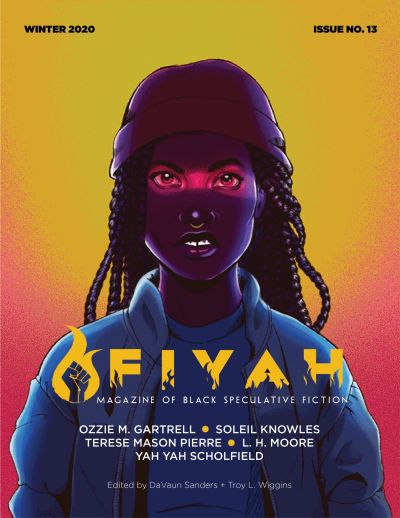The Spice of Life
Fiyah 13
Edited by Troy L. Wiggins

7 Feb, 2020
0 comments
Fiyah: A Magazine of Speculative Black Fiction is published by Troy L. Wiggins. Editorial staff are as follows: Executive Editor: DaVaun Sanders, Poetry Editor: Brandon O’Brien, Acquiring Editors: Danny Lore, Kaleb Russell, and Eboni J. Dunbar, Art Direction and Layout: LeKesha Lewis, and Cover Artwork by Steffi Walthall. This is Fiyah’s thirteenth volume.
Letter from The Editors
The big news is that Wiggins is stepping down as executive editor, although he will still play a role at the magazine.
“All That the Storm Took” by Yah Scholfield
Until Katrina, the sisters’ home had withstood everything New Orleans weather had thrown at it. Hurricane Katrina is unprecedented. The choices are flee and survive, but lose everything; or stay, die, and lose everything. Either way, dramatic change cannot be avoided.
“Roots on Ya” by L.H. Moore
An otherwise unremarkable gathering is disrupted when a jealous suitor uses dark magic on their rival. The curse itself can be managed; not so the cost of using such magic.
“Lusca” by Soleil Knowles
Despite a mother’s best efforts to guide her daughter towards acceptable demeanor, the call of the daughter’s true nature proves irresistible.
“The Transition of Osoosi” by Ozzie M. Gartrell
A young Black American seeks an alliance with African technologists. With their support he can begin unravelling America’s techno-apartheid state. All they want is proof of his resolve.
POETRY
“Aliens Visit the Caribbean” by Terese Mason Pierre
This is a poem and for some reason I cannot get my head around poetry.
General comments
There seem to be two recurring themes in the stories: ethics and transformation. Although perhaps in the case of “Lusca,” transformation isn’t quite the right term; the protagonist isn’t so much changing as embracing that which has always been. Their mother’s attempt to force them to transform into something more acceptable fails.
Ethics: seen in the story “Roots on Ya.” The moral: using magic for a curse rebounds on the magic worker. Straightforward enough.
Ethics and transformation: both seen in “The Transition of Osoosi.” The protagonist of “Transition” bestows … let’s call it an unrequested upgrade… on the white people of America. Was he justified in doing so? Cue arguments in comments.
I do have one major complaint: the magazine is too short. Fiyah is a damn good read that always leaves me wishing it were much longer
Fiyah 13 is available here.
